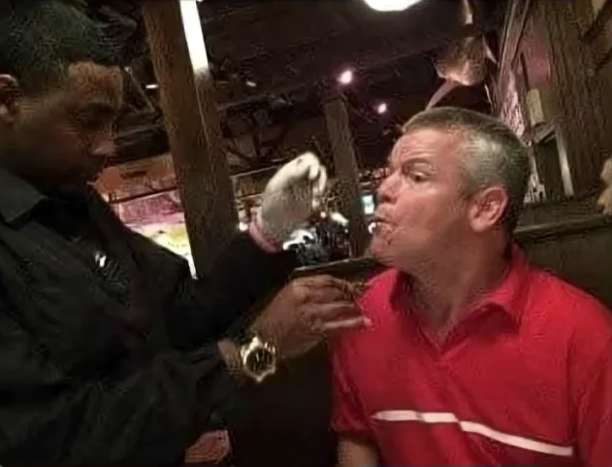
His name is Five. It’s the kind of nickname that sticks, the kind people remember. He waits tables at 42nd Street Oyster Bar in Raleigh while taking college classes, balancing the rhythm of orders and shifts with the rhythm of lectures and deadlines. It’s honest work. Tiring work. The kind where you’re always moving, always aware of which tables need water and who’s waiting on their check.
One afternoon during lunch rush, a woman named Linda came in with her son, Lee. The boy has cerebral palsy, and eating requires patience and assistance—something Linda provides with the quiet, practiced grace of someone who’s done it a thousand times. She ordered for both of them, settled into her seat, and began helping Lee with his meal.
Five noticed something. Linda’s food was getting cold. She was so focused on making sure her son was comfortable, on guiding each bite and wiping his chin, that her own lunch sat untouched in front of her. Steam fading. Warmth disappearing. The kind of small sacrifice parents make without even thinking about it.
Five didn’t announce what he was going to do. He didn’t ask permission or make a show of it. He simply walked over to his coworkers and asked them to cover his tables for a few minutes. Then he returned to Linda’s table and, gently, took over feeding Lee. His movements were careful, unhurried. He spoke softly to the boy, made him comfortable, made him smile. And Linda—Linda got to eat her meal while it was still hot.
She pulled out her phone and captured the moment, a simple photo that would soon travel around the world. Five, leaning in close, focused entirely on this child he’d just met. The image is quiet but powerful, showing something we don’t see often enough: a stranger caring for someone else’s family as if it were his own.
When the photo went viral, letters and messages poured in from everywhere. People recognized something in Five’s action that transcended the specifics of that lunch. They saw kindness that didn’t calculate. Compassion that didn’t wait to be asked. The kind of humanity that makes the world feel a little less lonely.
Five never wanted the attention. He’s humble, even shy about the whole thing. In interviews, he deflects praise, insists he was just doing what felt right. But that’s exactly why the story resonates. Because he didn’t do it for recognition. He did it because he noticed. Because he saw a mother sacrificing her own comfort and a child who deserved dignity and care. And he acted.
We live in a time that celebrates grand gestures—big donations, viral campaigns, dramatic rescues. But most of life happens in smaller moments. A meal getting cold. A mother too tired to ask for help. A waiter who notices and steps in without being asked. These are the moments that define us. Not the spotlight, but the quiet choices we make when no one’s watching.
Five’s story reminds us that the smallest acts can leave the biggest mark. That paying attention to the people around us—really seeing them—is a form of love. That sometimes all it takes to change someone’s day is a few minutes of your time and the willingness to care.
Somewhere in Raleigh, a college student waits tables and goes to class. But for one mother and her son, he’ll always be the stranger who made them feel seen. Who turned an ordinary lunch into a moment of grace. Who reminded them—and now all of us—that kindness like his can’t hide.